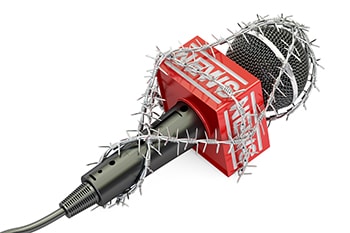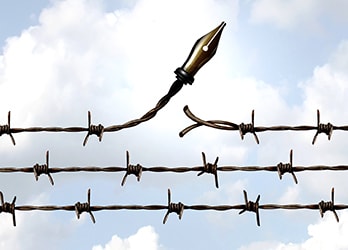Oman’s New Media Law
 The Sultanate of Oman has been one step forward in modernizing media development by coming out with a new media law issued under Royal Decree No. 58/2024. Officially, this law became in force on November 11, 2024, and is intended to consolidate and supersede the existing regulations that govern media activities in the country. The Media Law seeks to achieve more liberalization of freedom of expression, neutralization, and media industry conformity with Oman's Vision 2040. The new Media Law aims at maintaining public morality, social ethos, and national security.
The Sultanate of Oman has been one step forward in modernizing media development by coming out with a new media law issued under Royal Decree No. 58/2024. Officially, this law became in force on November 11, 2024, and is intended to consolidate and supersede the existing regulations that govern media activities in the country. The Media Law seeks to achieve more liberalization of freedom of expression, neutralization, and media industry conformity with Oman's Vision 2040. The new Media Law aims at maintaining public morality, social ethos, and national security.
The paper provides in-depth information regarding the features of the new law, licensing and regulatory requirements on contents, the kind of prohibitions and punishment involved.
Key Features of the New Media Law
- Enhanced Media Freedom and Expression
This means the law does, in fact affirm the right of media professionals to an opinion and to expression and therefore represents a step forward towards building a pluralistic and dynamic media environment. This legislation promotes free and open public dialogue while avoiding prior censorship on media activities; it's so long as what is to be expressed falls in line with what is considered lawful and proper within the culture of Oman and by the national interests of the state.
- All-inclusive Regulation of Media Activities
The law has many distinct features, the most significant of which is licensing. This covers newspapers, broadcasting channels, publishing houses, news agencies, and artistic works, their production, importation, and distribution as well as printed materials. The MOI has to issue licenses to both local and international media institutions while being under rigid rules set in place to build a systematized and open system, one that is open to innovation but keeps public confidence intact.
- Prohibition of Content for Public Safety
The law clearly defines the limits of media content, banning publications or broadcasts that may cause public disorder, interfere with the course of judicial proceedings, or offend public morals. Misleading advertisements and unethical practices are also banned to ensure that media content is accurate and truthful.
- Enhanced Right to Reply and Correction
To promote accountability and public trust, the law guarantees individuals the right to request corrections or responses to inaccurate media content. Media outlets are required to address such requests promptly and without charge, demonstrating a commitment to responsible journalism.
- Limits on Foreign Influence and Sponsorship
To ensure Oman's sovereignty in its media landscape, the law prohibits media entities and professionals from accepting foreign donations or privileges without prior approval from the MOI. This will prevent undue foreign influence and ensure that the media remains independent and reflective of national values.
- Licensing and Protection for Media Professionals
Media types must register and obtain licenses, which are supposed to control and protect them. The law will ensure confidentiality and secrecy for journalists' sources to enhance a professional standard in investigative journalism and reporting.
- Implementation and Sanctions on Offenders
Strict penalties are stipulated for infringements, including fines and imprisonment for unlicensed activities or content that threatens national security. Media companies and individuals alike are held accountable, reinforcing a culture of responsibility within the sector.
Licensing Requirements and Processes
- Licensing for Media Activities
Under the new law, media activities include publishing newspapers, operating audiovisual channels, and establishing news agencies, which need to be licensed by the MOI. Besides, the production, importation, and distribution of artistic works and printed materials shall also be licensed. However, entities belonging to the State's administrative apparatus and other public legal entities are exempt from this requirement.
Licenses issued under this law are subject to specific conditions, including the provision of a financial guarantee to ensure compliance with legal obligations. In cases of non-compliance, the guarantee may be used to address discrepancies. Further details on these requirements are expected in the forthcoming implementing regulations.
- Amendments and Transfers
Licensees are allowed to change their legal form, consolidate, acquire or transfer ownership under the conditions established in the rules. Licenses may be revoked if eligibility conditions are not met, a licensee becomes bankrupt or is lawfully dissolved, or licenses are not renewed within the time stipulated.
- Temporary Suspension
While license suspension or cancellation typically requires a final judicial ruling, the Minister of Information may temporarily suspend broadcasting or publishing for up to seven days, subject to judicial oversight for extensions. This provision ensures that media activities adhere to ethical standards without undue interference.
Rights and Responsibilities of Media Professionals
- Protections for Media Professionals
It further protects licensed media professionals with sufficient safeguards to be able to practice their profession free from coercion and interference. Among these safeguards are the protection of news sources' confidences, with the exception of national security concerns.
- Professional Standards
Media professionals are also expected to operate within the existing professional standards such as objective reporting, honest delivery of media messages, and correct representation of opinions with proper acknowledgement. They are also encouraged to emphasize Oman's rich history, cultural achievements, and developmental milestones to enhance the country's standing in the international arena.
- Licensing for Foreign Media Professionals
Media professionals working for foreign media outlets must obtain licenses to operate in Oman. Failure to do so may lead to the cancellation of licenses. Furthermore, media professionals can engage in advertisements or accept monetary or in-kind gifts only after permission by the media institution. In case of violation, the improper benefits received must be returned, and accountability measures also follow.
Prohibited Content and Regulation
- Content Forbidden
The new law prohibits content that deceives the public, violates public morals, or relates to matters under investigation without prior approval. The MOI still has the right to ban the publication or broadcast of certain content through official directives. However, prior censorship of media activities is strictly prohibited, and transparency and freedom of expression are encouraged.
- Artistic Works and Printed Materials
 Licensing is required for the production, importation, and distribution of artistic works and printed materials, which should not be in conflict with restrictions on public morals or national security. The MOI may alter or stop works that violate such stipulations. Artistic activities are also subject to supervision by the MOI, and works are assessed by specialized committees on their artistic, cultural, religious, or social content. Age restrictions can be applied to safeguard specific audiences.
Licensing is required for the production, importation, and distribution of artistic works and printed materials, which should not be in conflict with restrictions on public morals or national security. The MOI may alter or stop works that violate such stipulations. Artistic activities are also subject to supervision by the MOI, and works are assessed by specialized committees on their artistic, cultural, religious, or social content. Age restrictions can be applied to safeguard specific audiences.
Right to Reply and Correction
- Requesting Corrections
Individuals have the right to request corrections or responses to inaccurate media content. Requests must be submitted within 15 days of becoming aware of the inaccuracy or within 60 days of its publication, whichever is sooner. In cases involving judicial acquittals, individuals have up to 60 days from the ruling date to request corrections.
- Obligations for Media Outlets
Media houses are supposed to print correction or response, free of charge, within three days after the receipt of a valid request. The correction shall only cover what is wrong with the content originally published and printed in the same form, language, size, and period as that of the original publication. A media house shall be shielded from any liability arising out of the errant content, in case they comply with this law.
Violations and Penalties
The law imposes serious penalties for infractions, placing a strong sense of responsibility within the media sphere. Major violations and their penalties are as follows:
- Unlicensed Media Activities:
- Imprisonment for 1–3 years
- Fines ranging from 10,000 to 20,000 OMR
- Seizure of equipment used for violations
- Content Violations:
- Imprisonment for 3 months to 1 year
- Fines between 5,000 and 15,000 OMR
- Legal Entities in Violation:
Fines ranging from 100,000 to 200,000 OMR
- General Violations:
- Fines ranging from 1,000 to 10,000 OMR
- The Public Prosecutor or a Competent Court may suspend the activities of licensed media outlets for a period of up to 45 days during investigations or trials, with the possibility of extending this duration. In cases of repeat violations or threats to national security, the penalties may be doubled.
 Conclusion
Conclusion
The new Media Law for Oman marks a revolution in the way media regulation has been addressed by the country. By establishing freedom of expression, promoting accountability, and ensuring the protection of national values, this law establishes a robust framework for a modern media landscape. With the implementing regulations now in the process of being issued by the Minister of Information, it is now a new era for the media professional and institution in Oman.
 English
English
 عربي
عربي Русский
Русский 官话
官话 português
português
 Türk
Türk 






